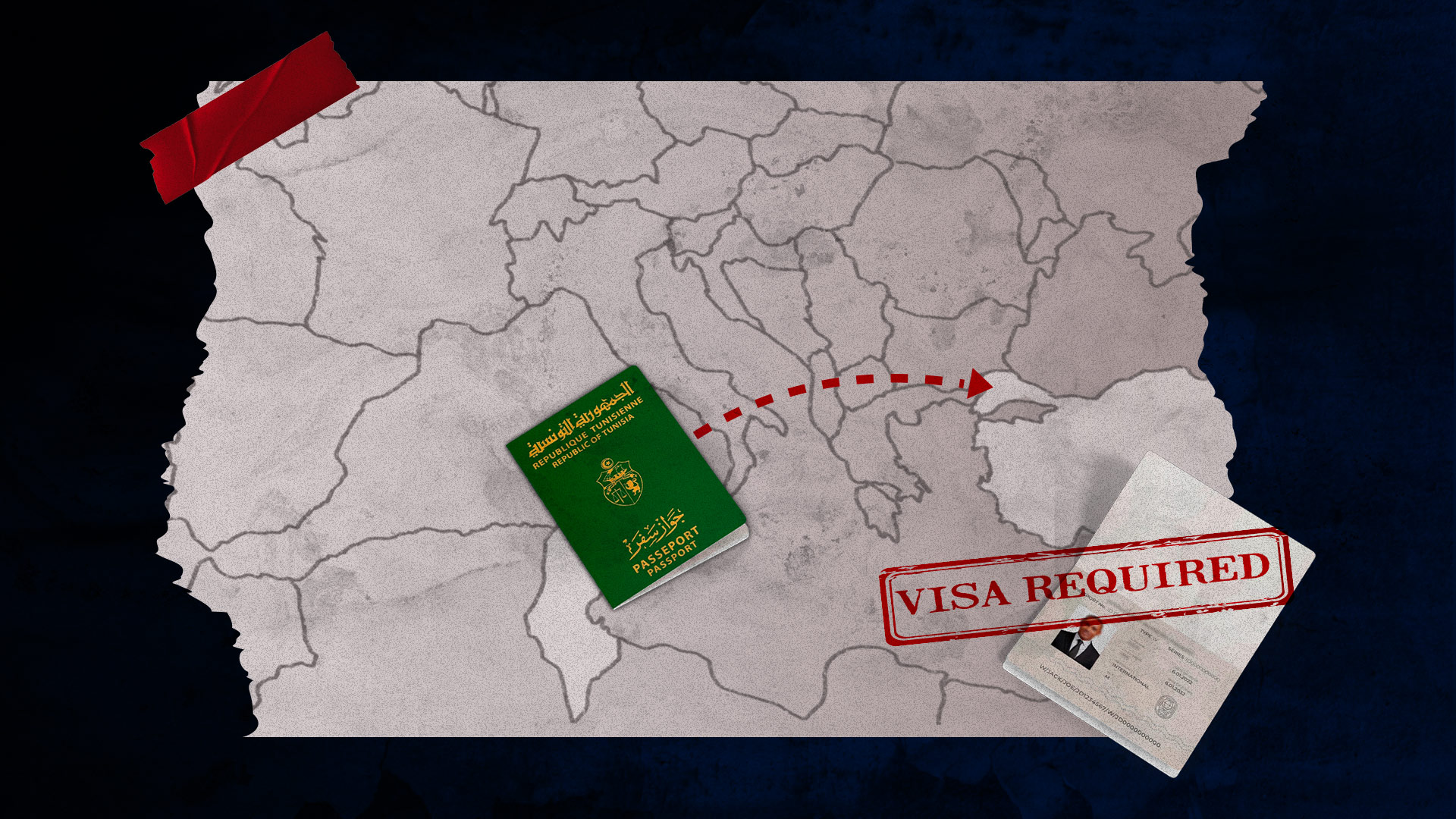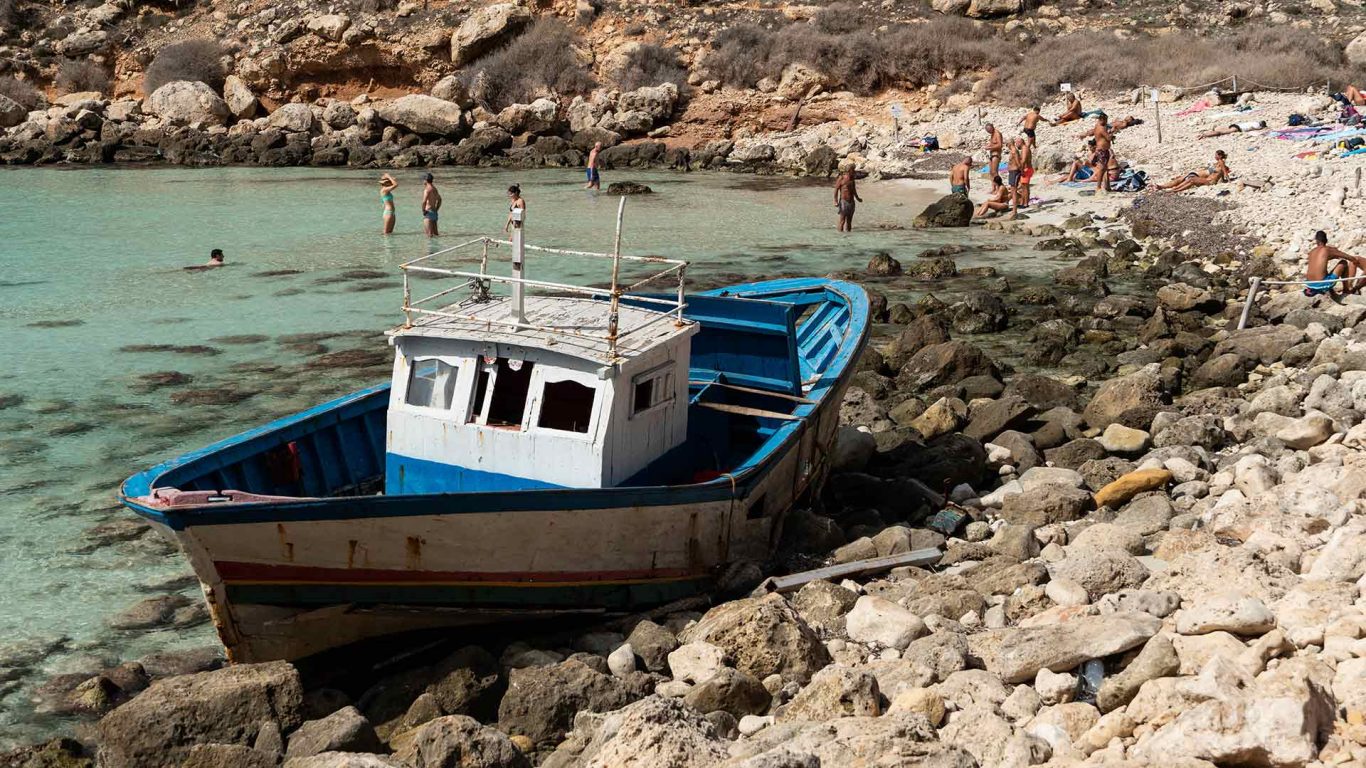However, starting from November 20, this treaty is no longer valid. Just like all other European countries, Serbia is now demanding Tunisian citizens to get a visa before entering their country. This decision comes after weeks of pressure on Serbia by the EU. Europe is now completely closed off for visa-free entries of Tunisians - with conditions to receive a visa becoming more and more strict and visas often being declined even if the applicant fulfills them.
Why does this change happen now?
Serbia is tightening its visa regime after intensified pressure from several member states of the EU. The EU is targeting Serbia, because they see the country as an entry point for irregular migrants. Anitta Hipper, the EU Commission’s Spokesperson for Home Affairs tells inkyfada: “ There is an increase in irregular arrivals from, and asylum applications to EU Member States by nationals of India, Tunisia, Burundi, and Cuba.” Citizens from these countries can travel to Serbia without a visa, but need a visa to enter the EU, which is why the EU sees Serbia’s visa policy as a reason for the increase in irregular migration.
The number of Tunisian citizens who enter the EU irregularly and ask for asylum is however comparably low - even though it has increased in recent years: In the first eight months of this year, 87.000 illegal border crossings via the Western Balkan route - of which Serbia is a part - were detected by the European Border and Coast Guard Agency Frontex - among which were 5777 Tunisian citizens. These numbers compare to roughly 62.000 irregular border crossings throughout 2021 - among which were 842 Tunisian citizens.
While these numbers are still much lower than during the so-called refugee crisis in 2015 and 2016, what adds to the pressure on EU countries this year are the more than five million refugees from Ukraine, who fled into the EU after the Russian invasion.
“ At this moment, in many European countries we have the largest number of refugees since the 40s”, says Gerald Knaus, migration researcher from Austria. "Because of this, all capacities like reception centers, foreigners’ offices and social welfare offices are at their limits. That creates a lot of nervousness when it comes to asylum applications from countries where the recognition rate is very low, like Tunisia and India. Because these asylum applications will most likely be rejected, but they still add to the enormous pressure that exists because of the reception of Ukrainian women and children.”
To lessen the pressure on their already overburdened offices, the EU is thus trying to reduce the number of people who enter the EU irregularly - especially from those countries with a low recognition rate of asylum applications. By pressuring Serbia to stop visa-free travel for Tunisian, Indian and Burundian citizens, the EU hopes to reduce the number of people who could try to enter the EU irregularly, although citizens of these countries are by no means the most represented among the people taking the Balkan route - in fact, the most represented nationalities are Afghans and Syrians.
Furthermore, at the moment, only around one percent of asylum applications submitted in the EU by Tunisian and Indian citizens are accepted. Looking at the number of asylum applications, according to Eurostat, during the first eight months of this year roughly 830.000 people asked for international protection in the EU - among them 11.825 Tunisian citizens.
How did the EU pressure Serbia into changing its visa policy?
There are two main reasons why Serbia gave into the pressure of the EU in the first place: the fear of losing their own visa privileges to the Schengen area and their accession negotiations with the EU. Since 2009, citizens of Serbia can travel to the Schengen area visa-free.
In October of this year, Ylva Johansson, the European Commissioner for Home Affairs, announced that Serbian citizens could lose their own privileges of visa-free travels to the Schengen area if the country does not change its visa policy.
In 2009 Serbia also presented its application for membership in the EU and was granted candidate status by the European Council in March 2012. In order to become a Member State, Serbia must fulfill several conditions - one of which is the alignment of its visa policy with the EU. Because of this - sooner or later - Serbia would have had to introduce visa requirements for Tunisian citizens anyways.This was confirmed by the European Commission. In their 2020 report, Tunisian citizens and citizens from 21 other countries should be “under the obligation to possess a visa when entering the EU whilst Serbia offers these nationals visa-free access to their territory”.
This means that in order to become an EU Member State, Serbia will have to introduce visa restrictions for all of these countries. Anitta Hipper, the EU Commission’s Spokesperson for Home Affairs, confirms that the EU Commission “ expects further alignment in line with the commitments of Serbia and will continue to follow closely.” This shows that beyond the reasons given above - a large influx of refugees and a desire to reduce irregular entries from the Balkan route - the EU is primarily looking for countries joining the EU to align themselves with the restrictive migration policies imposed on countries like Tunisia.
The EU is well aware of its position of power towards Serbia when it comes to its membership negotiations with the EU. Before Serbia gave into the pressure from the EU to change their visa policy, German interior minister Nancy Faeser said: “ They want something from the EU, they want to become a candidate country. In this respect, we have good arguments, I would say.”
Which countries pressured Serbia to change its visa policy?
On October 3rd, the leaders of Austria, Serbia and Hungary met in Budapest to discuss measures to respond to the increase of irregular migrants coming via the Balkan route - of which Serbia is a part. After the meeting, Austrian Chancellor Karl Nehammer announced the “ commitment by the Serbian President to bring Serbia’s visa rules in line with EU requirements” via Twitter.
As long as the fight against illegal migration & smuggling as well as repatriations on EU level do not work, we have to do everything to protect the borders together. In this matter, cooperation with Serbia & Hungary is particularly important. We have agreed on three concrete measures: 1. expansion of police cooperation for border protection with Serbia & Hungary as well as with Northern Macedonia. 2. support for Serbia in the implementation of repatriations. 3. assurance of the Serbian president @avucic, to bring Serbia's visa rules in line with EU requirements. This will mainly lead to a decrease in the number of illegal border crossings by people who entered via Serbia visa-freeSeptember 6, 2022
As long as the fight against illegal migration & smuggling as well as repatriations on EU level do not work, we have to do everything to protect the borders together. In this matter, cooperation with Serbia & Hungary is particularly important. We have agreed on three concrete measures: 1. expansion of police cooperation for border protection with Serbia & Hungary as well as with Northern Macedonia. 2. support for Serbia in the implementation of repatriations. 3. assurance of the Serbian president @avucic, to bring Serbia's visa rules in line with EU requirements. This will mainly lead to a decrease in the number of illegal border crossings by people who entered via Serbia visa-free.
German interior minister Nancy Faeser then further urged Serbia to take steps to reduce irregular migration . After a meeting of the interior ministers of several European countries in Luxemburg on October 13th, she stated that this is one of the most urgent topics is Serbia.
“Serbia has a visa practice that is not very nice, because it is based on which states do not recognize Kosovo. Serbia must change its visa practices now, not someday, but now.”
It indeed seems that whether a person can enter Serbia without a visa depends on whether or not their government recognizes Kosovo as a sovereign state. Burundi for example revoked its recognition of Kosovo in 2018, after which Serbia revoked the visa requirement for Burundians. This, however, is not the case for Tunisia, as the visa-freedom between Tunisia and Serbia dates back to 1965 - several decades before Kosovo formally declared independence in 2008.
On October 20, representatives from the Western Balkan countries and the EU then got together for the “Western Balkan Summit” in Berlin to discuss the current migration situation among other things. As was the case during the meeting of the interior ministers in Luxemburg, the representatives kept stressing the importance of creating legal migration and flight routes without actually addressing this issue. Instead more border protection measures were announced, like deploying Frontex officers to the Western Balkan borders, fighting smuggler criminality as well as pressuring Western Balkan countries to align their visa policy with the EU.
On the same subject
When Serbia then finally gave in and announced the end of visa-free travel for citizens of Tunisia and Burundi, EU politicians and European institutions celebrated the decision. Both the Serbian Ministry of Foreign Affairs and the Embassy of the Republic of Serbia in Tunis did not respond to requests from inkyfada, asking for a statement on the matter.
Grieving for the loss. But the same mothers had no problemencouraging or funding their children to embark on those dangerous journeys. Like in Senegal, symbolically prosecuting parents for putting at risk their children could trigger serious attitudinal change on death journeys. September 6, 2022
Towards a fairer and safer migration policy
Serbia stopping visa-free entry for Tunisians is only “ addressing a small symptom”, says migration researcher Gerald Knaus. For him the actual question that should be discussed is: How can we make it possible for many more Tunisians - also in the interest of Europeans - to travel easily and legally to the EU without any problems?
“ Reducing irregular migration is a goal of all European governments. But then they also have to have a strategy to enable legal migration and mobility”, he says. “ I think the whole debate about Tunisia in the EU is absurd. It really is time that the European Union make an offer to Tunisia that drastically increases mobility, legal mobility.”
“ Plus jobs are there, they must be filled”, he adds. In the second quarter of 2022 for example, 3% of jobs in the EU were vacant according to Eurostat. And looking at the aging population in Europe, the need for workers from other countries will increase even more in the coming years. Therefore it is also in the interest of the EU to increase legal mobility.
Even more important than economic interests is the protection of migrant’s lives. Since the beginning of the year, 544 migrants have died or went missing off the coast of Tunisia according to FTDES. The lack of legal migration routes will only push more people to try and reach Europe via the sea.







